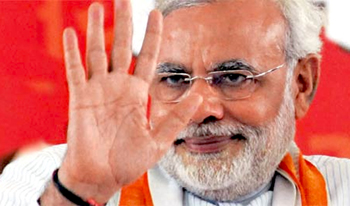New Delhi, Oct 31: Unveiling an austerity drive to cut non-plan expenditure by 10 per cent, the Narendra Modi government has barred bureaucrats from travelling first class on overseas visits and have been asked to use video conferencing as much as possible.
With an aim to restrict fiscal deficit to 4.1 per cent of GDP in 2014-15, the Finance Ministry has barred officials from holding meetings in five-star hotels and put a freeze on fresh appointments and filling up posts lying vacant for over one year.
 “While officers are entitled to various classes of air travel depending on seniority, utmost economy would need to be observed while exercising the choice keeping the limitations of budget in mind. However, there would no bookings in the first class,” said the office memorandum.
“While officers are entitled to various classes of air travel depending on seniority, utmost economy would need to be observed while exercising the choice keeping the limitations of budget in mind. However, there would no bookings in the first class,” said the office memorandum.
The facility of Video Conferencing, it said, “may be used effectively”.
The Finance Ministry said purchase of new vehicles to meet operational requirement of defence forces, Paramilitary forces and security organisations are permitted but ban on purchase of any other vehicles would continue. “Such measures are intended at promoting fiscal discipline, without restricting the operational efficiency of the government. In the context of the current fiscal situation, there is a need to continue to rationalise expenditure and optimise available resources,” it said. The government proposes to lower the fiscal deficit to 3 per cent of GDP by 2016-17. The deficit which had touched a high of 5.7 per cent in 2011-12, was brought down to 4.8 per cent in 2012-13 and further to 4.5 per cent in 2013-14 by way of austerity measures.
“The task before me is very challenging because we need to revive growth, particularly in manufacturing sector and infrastructure,” Finance Minister Arun Jaitley had said in his budget speech. He added that choice has to be made whether or not to be victims of mere populism and wasteful expenditure. The Finance Ministry said that the “mandatory 10 per cent cut” in plan expenditure will exclude interest payments, repayment of debt, defence, capital, salaries, pensions and grants to the state. “No re-appropriation of funds to augment the non-plan heads of expenditure on which cuts have been imposed, shall be allowed during the current fiscal,” it said.
It said the austerity measures would also apply to autonomous bodies, adding that no fresh commitments would be made over and above what was provided in the Budget. Only seminars and conferences that are absolutely essential should be organised, it said, adding that “holding of exhibitions/seminars/conferences abroad is strongly discouraged except in case of exhibitions for trade promotions.” It said in all cases of air travel the lowest air fare tickets available for entitled class are to be purchased. “No companion free ticket on domestic/international travel is to be availed of,” it added.
Referring to jobs in government departments, it said there will be a total ban on new posts and those that have remained vacant for more than a year will not be filled except “under very rare and unavoidable circumstances”. The Finance Ministry has also asked the departments to avoid bunching up expenditure in the last quarter to ensure that there is no infructuous or wasteful spending. It said the Secretaries would be responsible to ensure compliance of the austerity measures and the Financial Advisors would be required to submit reports to the Finance Ministry on a quarterly basis.
The non-plan expenditure of government deals with outlay on subsidies, interest payment, salary, among others.
For the current fiscal, the government has proposed a Plan expenditure of Rs 5.75 lakh crore, while that for non-Plan expenditure is over Rs 12.19 lakh crore.
Total budgeted expenditure estimates, including Plan and non-Plan stand at Rs 17,94,892 crore, higher than revised estimates for 2013-14 at Rs 15,90,434 crore.





Comments
Add new comment